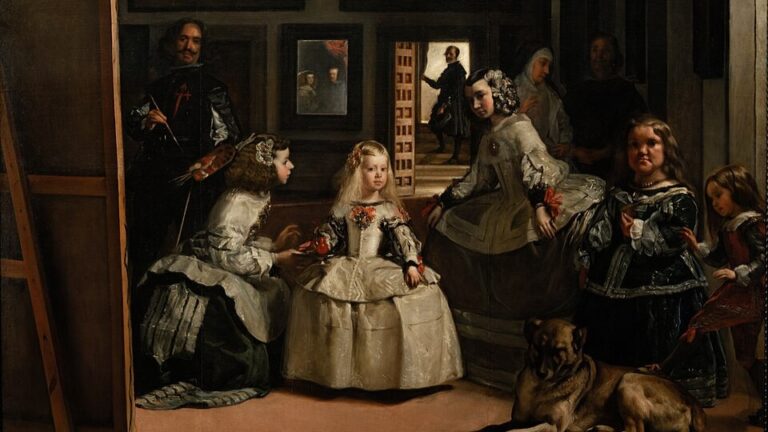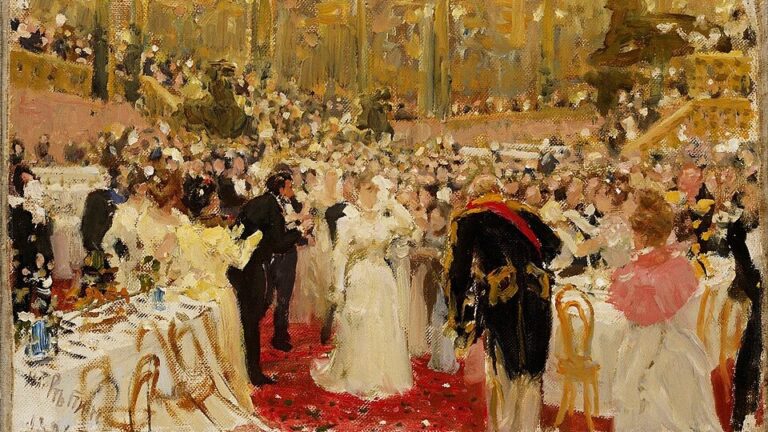The Individual and the Anti-Individual
The emergence of the ‘individual’ (and the individualism associated with it) in the modern sense, and the emergence of the so-called ‘mass man’ (and the collectivism associated with it), occurred almost simultaneously in European history. This tension has been reflected upon by numerous writers and philosophers who have been labelled either conservative or liberal, such as Ortega y Gasset and Erik von Kuehnelt-Leddihn.1 Michael Oakeshott, a prominent figure in British conservative thought, views this process from a profound and nuanced historical perspective.
This problem is particularly prominent in Oakeshott’s essay ‘The Masses in Representative Democracy’, which explores the emergence of modern individualism and collectivism through the concepts of the ‘real’ and ‘false’ individual. In this work, Oakeshott traces the origins of the individual back to the end of the Middle Ages. He argues that the ‘close fabric’ of collective and communal life—characteristic of archaic and pre-modern societies—began to visibly unravel during this period. At the beginning of the essay, he emphasizes that the emergence of the individual is the most important event in the history of modern Europe. It marks a fundamental rupture in European history: the rise of the individual appears as the decisive moment of modernity, one that radically transformed the course of history
Oakeshott sees the defining feature of the modern individual primarily in their ability to make decisions solely as and for themselves. Although he generally rejects progress-based thinking—especially in its teleological form—this development can nonetheless be understood as a kind of spontaneous evolution or ‘improvement’. According to Oakeshott, this shift occurred through a series of ‘irregular deviations’ from the medieval way of life and thought, which ultimately led to the crystallization of a distinct individual ‘type’ by the end of the Middle Ages or during the period known as the Renaissance, particularly in Italy.
‘The emergence of the individual is the most important event in the history of modern Europe’
According to Oakeshott, this change can be seen as a significant development, especially in light of the ‘limited’ possibilities of the Middle Ages, where constrained choices and tightly woven social bonds served as a kind of ultimate barrier to the emergence of individualized consciousness. He argues that there is little doubt that ‘individual human character’ was rarely observed in medieval life and thought. People primarily defined themselves through their social roles—as members of families, groups, the Church, or village communities. Identity was rooted in social belonging, which meant that common characteristics were emphasized over individual differences.
This social mode of life reached its peak in the 12th century, but from the 13th to the 20th century, it changed slowly and unevenly. The gradual possibility of breaking free from rigid social ties gave rise to new human characteristics. This ‘new experience’ of individuality became closely intertwined with developments in religion (as seen in the Reformation), in art and science, and also in commerce and industry (capitalism), as well as in the diversity of human relationships and moral thought—particularly in the tension between ‘individual reason’ and ‘authority’.
However, as a political and social philosopher, Oakeshott was especially interested in the domain of governance. It was in this field that the ‘new experience’ of the self most clearly emerged in the distinctively modern form of parliamentary government. Looking back from the present, one can truly say that this marked one of the most profound shifts in political thought in human history.
The setting for this turning point, however, was not Italy—but England. As Oakeshott writes:
‘It is not to be understood as an approach to some ideal form of government, or as a modification of a form of government that existed for a certain period in parts of the ancient world (with which it has nothing to do). It is simply what developed in Western Europe, where the influence of the pursuit of individuality on medieval institutions of government was greatest.’2
Oakeshott does not emphasize political participation and its necessity—as Hannah Arendt does, for example—but instead highlights a different need: the idea that parliamentary government is ‘the means of government capable of transforming the interests of individuals into rights and duties.’
According to Oakeshott, such a government must possess three essential characteristics in order to fulfill this crucial role. As he writes:
‘In short, the circumstances of modern Europe, even as early as the sixteenth century, bred not a single character, but two obliquely opposed characters: not only that of the individual, but also that of the “individual manqué”.’3
If we accept the author’s view that the modern concept of individuality is a genuine ‘achievement’, then it follows logically that it also requires a politically conceived means of self-defence—one capable of protecting the interests of the ‘new individual’ against the lingering and persistent collectivist structures of society. The central interest of Oakeshott’s study—somewhat in contrast to the dominant liberal and socialist paradigms of progress—is that it not only highlights the ‘greatness’ of the modern individual, but also introduces the counterpoint: the concept of the ‘mass man’. This is a crucial insight if we are to understand the most significant social developments of modernity.
Oakeshott attributes the rise of the mass man not merely to natural inadequacy, but also to a profound sense of moral inferiority. This feeling, when combined with innate behavioral deficiencies, gives rise to a new and increasingly militant tendency: ‘anti-individualism’. Frustrated by their own shortcomings and moral humiliation, these anti-individuals seek to reshape the world in their own image—by stripping the individual of moral authority and toppling him from his throne.
There is no doubt that, for Oakeshott, the concept of modern individuality represents a genuine ‘human achievement’. At the same time, it is clear that every so-called evolutionary breakthrough can have significant repercussions—just as every technical invention or innovation brings with it certain disadvantages, often not immediately visible.
As Oakeshott emphasized, not everyone responded to the new conditions in the same way. With the emergence of the ‘individual’, a deeply contradictory counter-character also appeared—one that emerged in far greater numbers than the so-called modern individual. This figure is not simply a continuation of the collectivist structures of the pre-modern world, but rather something entirely new. Oakeshott refers to it as the inadequate or deficient individual.
‘…And this “individual manqué” was not a relic of a past age; he was a “modern” character, the product of the same dissolution of communal ties as had generated the modern European individual.’4
Oakeshott immediately adds that, like the ‘true individual,’ the ‘anti-individual’ also begins to seek opportunities to defend his interests against perceived or actual threats. He finds his opportunity the moment he realizes he belongs to the most populous class of modern European society—a class composed of individuals incapable of making independent decisions. This situation differs significantly from that of the Middle Ages or earlier, when decision-making was simply not an option for the broad social strata. In contrast, the modern anti-individual becomes aware not only that he is not alone, but that he possesses overwhelming numerical superiority. At that symbolic moment, the mass man appears.
‘The mass man is incapable of making authentic, personal decisions in situations of crisis or autonomy. For this reason, he requires a leader’
The key point lies in the anti-individual’s realization that he can escape the ‘predicament’ of individual decision-making only with the support of others like himself. The mass man is incapable of making authentic, personal decisions in situations of crisis or autonomy. For this reason, he requires a leader—someone who can think, decide, and act on his behalf. Historical analogies may be drawn (such as Plato’s and Aristotle’s critiques of ‘democratic tyranny’), but this modern type of leader is something new. He is not a king, emperor, pope, or traditional spiritual-political figure. Rather, he is a creation of the mass man’s needs: a figure who tells him what to think, translates his impulses into demands, and converts those demands into plans. Crucially, the leader makes the mass man aware of his own power, which rests on numerical superiority and conformity. While Oakeshott does not explicitly name this type of leader, it is clear that such figures most readily emerge in the modern mass states—whether under communism, National Socialism, or even within liberal democratic systems.
The morality of the ‘anti-individual’ must be radically egalitarian. In practice, everyone in society must be equal, and social order is considered most just when individuals possess as few distinguishing characteristics as possible. According to Oakeshott, modern ‘mass consciousness’ views private property as one of the greatest obstacles to equality and uniformity, and as a key factor in the emergence of individuality.5 What serves the interest of this class must be imposed upon all of humanity; this, in their view, is the only solution to their ‘problems’. This attitude is most clearly expressed in the writings of Marx and Engels.6
It should be added that such aspirations are not unique to communism; they are characteristic of many modern social paradigms, or at the very least, not foreign to them. While communist ideology explicitly emphasizes opposition to private property, the emergence of ‘mass consciousness’ is also compatible with systems that affirm private ownership. Regardless of the position taken on this issue, the pursuit of equality and uniformity is also characteristic of modern democracy (which may call itself social, socialist, or liberal), and National Socialism and fascism also had similar characteristics.
The Morality and Governance of the Anti-Individual: The Rise of the ‘Popular Government’
Just as the individual creates moral norms and forms of government that reflect his or her own character, so too does the ‘anti-individual’. According to Oakeshott, the anti-individual values ‘equality’ and ‘solidarity’ more than ‘freedom’ and ‘autonomy’. Because the morality of the anti-individualist is fundamentally egalitarian and strives for complete uniformity, the mass man finds comfort in perceiving others as mere reflections of himself. Any deviation from this absolute similarity is met with rejection.
In line with this moral framework, the anti-individualist establishes a particular form of government, which Oakeshott refers to as ‘popular government’. In such a system, government is conceived as the exercise of power aimed at enforcing and maintaining a perceived ‘common good’, while governance is understood as the act of others making decisions on our behalf—decisions we are unwilling or unable to make ourselves.
In Oakeshott’s interpretation, this concept of government stands in sharp contrast to ‘parliamentary government’. While the latter arises from the pursuit of individuality, ‘popular government’ emerges as a form specifically shaped by the influence of the masses. The result of the changes introduced by popular government is a significant expansion of governmental power. However, this power is only seemingly the power of ‘the people’, since ‘the masses’ possess no real ideas or demands of their own. They are driven primarily by instincts—whether innate or shaped by political, social, and historical influences—and are therefore incapable of genuine self-determination. Their thoughts and desires are articulated for them by ‘leaders’, who become the true beneficiaries of so-called popular government. In this system, politics ceases to be a matter of ‘government’ in the traditional sense and becomes a matter of ‘leadership’: according to Oakeshott, there is a clear and sharp distinction between the two.
The ‘anti-individual’ promotes the system of ‘popular government’ as a means to enforce rights, driven by the mistaken belief that the masses are denied individual rights due to their circumstances—particularly poverty. However, according to Oakeshott, the ‘mass man’ already possesses these rights; what prevents their exercise is not his circumstances, but his fundamentally anti-individualistic nature. As a result, the rights demanded by anti-individualists often come at the cost of abolishing those rights that align with individuality. Thus, popular government seeks to transform parliamentary government to function in accordance with the desires of the mass man. This new political ‘art of leadership’ is no longer about reconciling individual conflicts or even maintaining a parliamentary majority. Rather, it is about distinguishing which proposal will win the most votes and presenting it as if it had been initiated by ‘the people’. The mass man is particularly susceptible to the promise of relief from the burden of choice; the offer of ‘salvation’. In Oakeshott’s view, anyone who makes such an offer can confidently demand, and ultimately obtain, unlimited power.
Societas and Universitas
Oakeshott, building in part on his earlier studies of the masses and democracy, defined two concepts of the state in his definitive work On Human Conduct. These concepts are Societas (civil association) and Universitas (entreprise association). According to Oakeshott, Societas is an association whose members, although they have common interests and affinities, are nevertheless separate from each other and do not come together to achieve a common goal, but rather within the framework of a set of non-instrumental rules of conduct.
‘Societas is an association whose members…are nevertheless separate from each other and do not come together to achieve a common goal’
In contrast, Universitas is an association in which members set aside their differences to a certain extent and, in unity, move toward the formation of a single will or ‘person’ on important issues. Universitas is thus based on the fundamental idea of many people, around a common fundamental goal, in the interests of efficiency, transcending the individual differences that set people apart. Oakeshott cites late medieval monastery churches, cathedral assemblies, monasteries, guilds, and medieval universities as the first examples of Universitas.7
However, we find no concrete examples or names for the concept of ‘civil association’. This can be explained primarily by the fact that Oakeshott is not referring to specific organizations or groups, as in the case of ‘enterprise association’. If we still want to see a concrete example, we could think of a specific system of relationships or a spiritual or intellectual attitude that enables, for example, the creation of a transport system (such as traffic regulations); or, to use an example close to Oakeshott, something like the characteristic set of rules of a sport.8
In the second essay of On Human Conduct, he also calls the ideal political state ‘nomocracy’. This is more deeply connected to the idea of the ‘rule of law’—not just in its modern sense—but in its original meaning, as it appears in Plato’s The Laws. In such a ‘rule of law’, which Oakeshott considers ideal, laws do not exist to prescribe a certain ‘good life’ or social goal, but to provide a framework for individuals to freely pursue their own goals.
In a Universitas-type society, by contrast, the state is an aim-oriented entity in which the law is a means to an end and government functions as administration. Oakeshott refers to such social and political arrangements as ‘teleocracy’.9
Based on Oakeshott’s primary analysis, it can be clearly stated that he would prefer the state as defined by the concept of Societas. However, the Universitas (enterprise association) is originally voluntary in nature (such as: ‘becoming a monk’ in the Middle Ages), in sharp contrast to the Societas. This is a very important distinction, drawing attention to the fact that the original nature of the Universitas is changing in modernity.
In Universitas—as in the case of a medieval monastery or a university (from which the word itself derives)—individuals were originally bound together by the intention to achieve a specific, common goal, and members of the association were free to decide whether they wished to participate in the enterprise. In contrast, for Oakeshott, the Societas is something that is not (or only to a very limited extent) voluntary. At birth, people are placed into a worldview, religious and political traditions, and a corresponding state order—all of which are closely interrelated—and from which they cannot simply ‘opt out’.
‘In Universitas…individuals were originally bound together by the intention to achieve a specific, common goal, and members…were free to decide whether they wished to participate in the enterprise’
Although individual cases and counterexamples are possible—such as when a person leaves ‘Christian civilization’ and converts to ‘Muslim civilization’ (or vice versa)—the rarity of such transitions underscores how difficult they are. They often involve relocating to a different state order or, if that is not possible, accepting the serious consequences and risks of statelessness. Belonging to a civilizational framework or a state is fundamentally not a matter of choice. We do not choose it—but our freedom, in the ideal cases outlined, lies precisely in the ability to pursue our own goals freely, even within frameworks that are inherent from birth.
Oakeshott’s most important dilemma is precisely that the modern state—or rather, the modern state of the mid-20th century—seems inclined to behave less and less like a Societas and more and more like a Universitas, that is, to prioritize a specific, common goal. In the case of communist states, this may be the idea of ‘social justice’ or ‘economic growth’ that is most often emphasized; in the case of the fascist and National Socialist states of Oakeshott’s time, the rhetoric centres around ‘the greatest happiness of the race’ or ‘national greatness’.
Thus, the most dangerous turn in relation to the medieval and modern Universitas lies in the fact that in modernity, the state itself begins to take on the characteristics of the Universitas, and to an increasing extent. If the state ultimately becomes completely Universitas-type, then voluntarism ceases to exist for the citizen (here the originally voluntary Universitas and the non-voluntary Societas seem to merge in a deviant way), since they cannot choose whether to participate in the ‘common enterprise’. According to Oakeshott, this could be a factor that led to totalitarian tendencies in the first half of the 20th century, and ultimately to a restriction of freedom that was most favourable to the ‘mediocre individual’ and its ‘leaders’. Although Oakeshott did not emphasize this sufficiently, we may add that totalitarian tendencies were not limited to powers opposed to ‘liberal democracies’, but were also present in the opposing camp, albeit often in different but no less noticeable forms.10
‘Belonging to a civilizational framework or a state is fundamentally not a matter of choice’
According to Oakeshott’s essay, however, it is important to emphasize that neither the Univesitas nor the Societas is capable of defining the modern state on its own. Together, however, these tendencies make the complexity and fundamental ambiguity of the modern state understandable. There are two incompatible tendencies, denoted by the words societas and universitas, and these two tendencies reveal the ambiguity that forms the basis of the state; thus, the modern state can even be interpreted as an unresolved tension between two fundamentally incompatible tendencies.
Oakeshott traces this tension back to the medieval kingdom. In his view, the medieval kingdom, like the modern state, implicitly contains both Societas and Universitas elements. From the perspective of Societas, the ruler (who is also the ruler, and not the ‘leader’ of the ‘true individual’) of the medieval kingdom was the king, who was not understood as the supreme authority—certainly not as a ‘dictator’—but rather as the guardian of peace and the supreme dispenser of justice. However, the gradual expansion of the royal justice system in medieval kingdoms ultimately led to the recognition of the king as a legal entity already embodying the characteristics of the Universitas.11
According to Oakeshott, what made the medieval kingdom interpretable also as Universitas was above all the king’s priestly power. (As we see in the case of the investiture struggles: the Church wanted to preserve this power from him.) However, according to Oakeshott’s argument, this demand was rejected by almost all late medieval European rulers. Let us add that this is most evident in the case of the Reformation, when rulers such as the Tudors seized the functions of ‘supreme priest’ and the role of ‘head of the church’—but this also often happened in Catholic areas, as in the case of Gallicanism. What the Church lost at that time, the king seized and added to his power. The king considered the spiritual well-being of his subjects to be just as important as their material well-being.12
Neither the Societas nor the Universitas can be clearly linked to Oakeshott’s concept of ‘lordship’, which is also associated with the medieval kingdom. This concept—perhaps best described as ‘feudal law’—refers to an archaic, pre-modern conception of the state or political power, where the personal character comes to the fore: this form of rule is, in fact, what Oakeshott believes most characterizes all truly pre-modern societies. Here, it is the person of the lord who represents power—not the abstract concept of the state or a system of laws. Lordship—although Oakeshott does not explain this in sufficient detail or clarity—is best characterized by the ‘intertwining of goals and interests’. The lord’s rule is often intertwined with his own interests, goals, and will, leaving no room for the modern individual’s specific aspirations for freedom in this regard. Yet ‘lordship’ becomes the opposite of Societas without being unambiguously linked to Universitas. The political authority that Oakeshott considers most fruitful for ‘true individuality’ rests in the Societas on the acceptance of laws and legal procedures, not on the will of a personal lord. Although ‘lordship’ is not Universitas in nature, there is a potential overlap or tension between them in terms of their purpose. What medieval ‘lordship’ has most in common with Universitas is its hierarchical structure: similar to the ‘enterprise association’, ‘lordship’ also has a decision-maker (the lord) and subordinates who must serve a common goal. Oakeshott’s criticism of the relationship between the modern state and the medieval monarchy was also directed at the fact that if the modern state adopts a Universitas-type mode of operation without being voluntary (like a true Universitas), it may take on the authoritarian traits of lordship.
‘Neither the Univesitas nor the Societas is capable of defining the modern state on its own. Together, however, these tendencies make the complexity and fundamental ambiguity of the modern state understandable’
The ‘true individual’ seems to be possible only in a state that is—decisively—a Societas, that is, a form of civil association. Here, individuals are fundamentally defined by the decisions they make, and only in a state understood as a Societas can this freedom of decision-making, which Oakeshott considers ideal, prevail.13 When we talk about a political system that corresponds to ‘true individuality’ and examine a modern state, Oakeshott argues that it is not enough to ask whether a given state is ‘sovereign’ or not. Rather, it is worth examining whether the government in question performs its functions in a nomocratic or teleocratic manner.
Speaking of Universitas, the two most important points that facilitate the interpretation of the state as Universitas are the emergence of centralized government (incorporating the remnants of medieval lordship) that has generally developed in modern states; and clearly the emergence of the previously analysed individual manqué. These tendencies are not independent of each other in their origins, but are deeply analogous to a form of modern spirituality and mentality, intertwining to create what we can call the modern, Universitas-type state.
Oakeshott captures the coercive nature and tendencies of modern states in four different manifestations of ‘teleocratic faith’. In the first narrative, the state appears as a cultural and religious Universitas: however, this is less modern and more characteristic of the (late) medieval state. In the second, the state can be interpreted as an enterprise exploiting the resources of the land. The third narrative is the idea of ‘enlightened’ government, which combines the first two. In the fourth, the state appears as a kind of medical organization whose goal is to ‘heal’ a society that can be regarded as sick. The latter has a strongly technocratic character and can also be seen as a kind of extension of the enlightened narrative. This idea is underlined by the fact that one of the fathers of Oakeshott’s conception of the state as an enterprise was the technocrat Francis Bacon (see his technical utopia, New Atlantis), one of the earliest examples of rationalist state planning. For Oakeshott, Bacon and the technocratic spirit he represented were one of the main ‘enemies’ of freedom. One of the most effective and characteristic trends, the so-called ‘narrative of enlightened government’, emerged in the 18th century. In this narrative, virtue is not defined as an otherworldly goal such as in the medieval state, but as worldly, that is, related only to this world: Oakeshott sees the ‘enlightened’ narrative of government as a secularized version of the religious and moral Universitas. The fourth narrative fosters the idea that people are sick, and the state appears as a healing organization.
Although the forth narrative is strongly characteristic of the modern era (and particularly reinforced in the period since Oakeshott’s death: some authors today speak explicitly of the ‘medicalization of society’14), it is not entirely new. Oakeshott emphasizes that this idea can already be found in many religious teachings; but the notion that illness is curable, that it is not unlimited and universal, even if it is a terrible historical illness, and that it is the government’s job to treat or cure those affected, has only emerged in the modern era. He notes that many diseases, such as poverty, insecurity, oppression, and alienation, were diagnosed during the Enlightenment and later on.15
He argues that the tendency toward teleocracy is not a new response to contemporary challenges, but has been a constant feature of European political consciousness for more than five centuries, and took its final form three hundred years ago in the aforementioned ‘enlightened idea of government’.
Oakeshott therefore consistently resists the temptation to attribute deeply rooted political tendencies to recent, superficial developments. The human instinct to use the state as a means to achieve the perceived common good is a long-standing pattern that has merely taken on a new form in the modern era. He also argues that the view of the development of the modern European state as a final step towards the Universitas often has romantic rather than rationalist roots. Universitas narratives can only be considered ‘rationalist’ in a limited sense, as some ideologies striving for Universitas romanticize history as a long and arduous endeavour to restore the intimacy and warmth of community bonds, which were supposedly lost due to the ‘cold and selfish’ nature of modern individualism. Romanticizing tendencies often misinterpret or disparage the real achievements of modern European states in promoting Societas by mistakenly equating it with the emergence of atomized, self-interested societies. Neither modern Societas nor the individuals who thrive in it can be reduced simply to the excesses of capitalism, selfish individualism, or pejorative ‘bourgeois morality’.
‘The persona proper to civil association,’ he writes, ‘is the person Montaigne celebrates, which is neither a savage egoist, nor a cold capitalist, nor a vile and despicable bourgeois of myth, now considered a moral disgrace.’16
This observation highlights Oakeshott’s conviction that true individuality is far removed from the caricatures often put forward by critics who, perhaps unwittingly, pave the way for a nostalgic longing for community that ultimately dominates political discourse. In his view, it is precisely these ‘parodies of tradition’ that create a breeding ground for the revival of collectivist ideas.
- Erik von Kuehnelt-Leddihn, for example, speaks of the ‘herdist man’ in relation to modern society (in his work entitled The Menace of the Herd, written under the pseudonym Francis Stuart Campbell, who was a born enemy of all hierarchies and value systems based on personality). As he argues: ‘such people are more impressed by the sight of a skyscraper with a thousand identical windows than by a painting by Botticelli or Zurbarán.’ They hate everything that is original and unique, and their ideal environment is the ‘megapolis’ (already proposed by Spengler).
As Kuehnelt-Leddihn continues: ‘The true herdist (who certainly is not always a pervert) is nothing but an egoist who cannot tolerate anybody differing from himself. John Doe, the identitarian, wants a nation, a world, a universe peopled by millions of John Does. He cannot sympathize nor like anybody at variance with John Doe. No wonder that his wishful dream is a humanity of John Does without God or Devil. The herdist is by necessity a humanitarian.’ (Erik von Kuehnelt-Leddihn [Francis Stuart Campbell], The Menace of the Herd, Milwaukee, The Bruce Publishing Co, 1943, p. 20.) ↩︎ - Michael Oakeshott, The Masses and Representative Democracy, p. 156, https://ia803400.us.archive.org/28/items/the-masses-in-representative-democracy-michael-oakeshott/The%20Masses%20in%20Representative%20Democracy%20-%20Michael%20Oakeshott.pdf, accessed: 9 July 2025. Oakeshott thus argues that the modern conception of ‘parliamentary government’ represents a radical break from the reality of ancient parliamentarism—as found in the Greek and Roman republics and their notions of democracy—and that references to the latter are largely rhetorical devices. This theory is debatable, but it remains coherent when examined within the broader context of Oakeshott’s political thought. ↩︎
- Ibid, p. 158. ↩︎
- Ibid. ↩︎
- Ibid, p. 162. ↩︎
- Ibid. ↩︎
- Michael Oakeshott, On Human Conduct, Oxford, Clarendon Press, 2003, pp. 242–243. ↩︎
- As a more distant example, we could also mention Oakeshott’s unique views on history (see for example Lectures in the History of Political Thought), which he sees not as a process moving toward a predetermined goal, but rather as a continuous, open conversation with the traditions of the past. This conversation—similar to the fundamental nature of civil association—is not aimed at achieving a specific result, but rather at a richer understanding of the life of the individual. ↩︎
- Oakeshott, On Human Conduct, pp. 202–206. ↩︎
- Erik von Kuehnelt-Leddihn provides convincing and abundant examples of this phenomenon in his books Leftism: From de Sade and Marx to Hitler and Marcuse and Liberty or Equality: The Challenge of Our Time. ↩︎
- Oakeshott, 2003, p. 213. ↩︎
- Ibid, pp. 206, 213. It is important to note, however, that Oakeshott does not address the specific sanctity of royal power in his argument—the idea originating before the Middle Ages that the king is not merely a ‘worldly’ figure and ruler, but embodies the symbolic ‘divine order’ through his presence in society. The claim of medieval and early modern kings—and thus also of the ‘Ghibelline’ rulers—to the ‘supreme priesthood’ can even be interpreted as a modern revival of an archaic spiritual model, which is, however, rather distorted and often totalitarian. Their claim to the ‘high priesthood’ can be interpreted as a modern reflection of an archaic spiritual model which, however, emerged in a rather distorted form—often tending toward totalitarian rule, especially in the case of rulers such as Henry Tudor or Ivan the Terrible. In their personalities, especially in relation to their demand for terror and ‘dominion over souls’, something is already clearly evident that can also be seen in later, explicitly modern dictators. To avoid misunderstandings, unlike Oakeshott, we should emphasize that this is not an archaic trait. ↩︎
- Ibid, pp. 242–243. ↩︎
- See especially the chapter entitled ‘The Melioration of Fate and the Medicalization of the Human Condition’ in the volume Nonmodern. (Áron Czopf, Márk Horváth, Ádám Lovász, Nonmodern. A Spherical Theory of Exteriority, BLA Knowledge Base, 2024, pp. 193–225.) According to the authors, in the current phase of modernity, we can speak of a real ‘therapeutic state’ that does not shy away from ‘medical imperialism’ in order to ‘secure the future’. It is difficult to imagine a less ‘Oakeshottian’ situation than this. ↩︎
- Oakeshott, 2003, pp. 307–310. ↩︎
- Ibid, pp. 320–322. ↩︎
Related articles:






